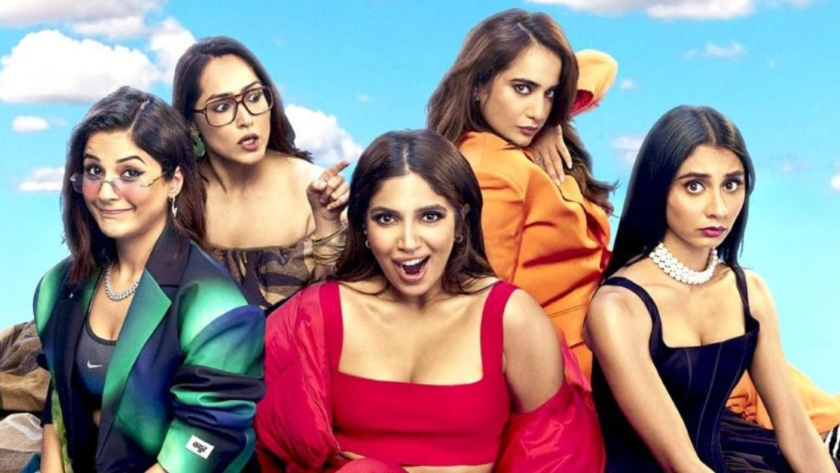“Thank You For Coming” is a heartfelt story following Kanika Kapoor (Bhumi Pednekar), a woman living in Delhi with her mother Beena (Natasha Rastogi) and grandmother Kishori (Dolly Ahluwalia). From a young age, Kanika has faced criticism for being raised by a single mother and for her progressive views. Her pursuit of love leads her through a series of failed relationships, leaving her disheartened as she approaches her 32nd birthday. Adding to her concerns, Kanika has never experienced an orgasm.
On her birthday, Arjun Malhotra (Karan Kundra) shows interest in Kanika, but he arrives at her party with a date, Rushi Kalra (Shehnaaz Gill). Surprisingly, Rushi and Kanika become friends, and Rushi advises Kanika to marry someone who truly loves her. Kanika discovers Jeevan (Pradhuman Singh), a simple and adoring man who sells toilet showers, and decides to marry him despite objections from her mother and best friends, Pallavi (Dolly Singh) and Tina (Shibani Bedi). At the engagement party, Kanika invites her ex-boyfriends, including Booni Bhatia, Shekhar Sinha, Rahul Kasturia (Sushant Divgikar), and Professor (Anil Kapoor). She indulges in heavy drinking at the party. The next day, she wakes up with no recollection of the previous night, except for the revelation that she experienced an orgasm for the first time. However, she can’t remember who she slept with—Jeevan, Booni, Shekhar, Rahul, or Professor. The film unfolds as Kanika attempts to unravel this mystery.
Radhika Anand’s story holds promise and could have been groundbreaking, but the screenplay has its ups and downs. While some scenes are impactful and entertaining, others could have been written more effectively. Radhika Anand and Prashasti Singh’s witty dialogues shine in select moments, like the character who claims to achieve orgasm merely by admiring her own body. The film could have benefited from more such clever one-liners throughout.

Image Courtesy – Shehnaaz Gill Instagram
Karan Boolani’s direction is commendable, addressing important themes such as childhood traumas, societal judgments on women living life on their terms, women shaming other women, and the prevalence of women not experiencing orgasm. Instead of adopting a preachy tone, the film uses humor and poignant scenes to convey these messages. Moreover, the plot’s outrageous premise intrigues viewers, particularly as Kanika embarks on her mission to uncover her mystery partner from the engagement party.
However, the film’s pacing is sometimes too brisk, hindering the organic growth of characters. Kanika’s sudden decision to marry Jeevan feels abrupt, and the film misses the opportunity to explore the professional achievements of its female characters. Professional success is important for women, but this aspect is largely neglected in the film. The humor is limited, and the school finale comes across as somewhat silly.
In terms of performances, Bhumi Pednekar shines in a role that is quite different from her previous semi-urban and rural characters. Dolly Singh and Shibani Bedi provide solid support, while Pradhuman Singh’s transformation is impressive. Natasha Rastogi and Dolly Ahluwalia deliver their roles admirably. Shehnaaz Gill, although entertaining, has limited screen time. Kusha Kapila (Neha) is underutilized, and Gautmik (Karan) and Saloni Daini (Rania Das) make a positive impact. Sushant Divgikar delivers a good performance with a strong screen presence, while Karan Kundrra’s performance is satisfactory. Anil Kapoor’s cameo is excellent.
The songs are seamlessly integrated into the narrative, with “Desi Wine” being the standout track, followed by “Pari Hoon Main,” “Haanji,” and “Baaraat.” However, none of the songs are chartbusters. Aman Pant’s background score serves its purpose effectively.

Image Courtesy – Shehnaaz Gill Instagram
Anil Mehta’s cinematography is clean and visually pleasing. Manisha Melwani and Devanshi Tuli’s styling adds to the film’s appeal, and Disha Dey’s production design reflects realism. Shweta Venkat Mathew and Manan Sagar’s editing is sharp, maintaining the film’s pace.
In summary, “Thank You For Coming” is a progressive film that addresses important themes, offers entertaining moments, and delivers a surprise element. However, it is hindered by its script, limited humor, and a somewhat frivolous climax. The film’s lack of widespread awareness may affect its box office performance, making it appeal primarily to a niche audience in multiplexes.




